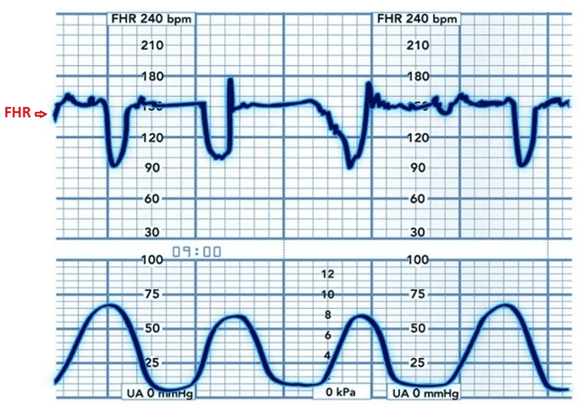What is the full form of FHRFHR: Fetal Heart RateFHR stands for Fetal Heart Rate. As the name suggests, it is the heart rate of your baby (fetus) when it is inside your womb. It is usually measured by a radiologist as a part of your routine checkup during pregnancy. It generally varies from 120 beats per minute (bpm) to 160 beats per minute (bpm). The FHR tends to decrease over time during pregnancy, e.g., During the first 8 to 10 weeks of pregnancy, it can be as high as 180 bps, and during the last weeks of pregnancy, it can be as low as 120 bps. 
Some people believe that baby?s gender can be predicted from the FHR, but it is a myth, not a reality. There is no significant difference between male and female heart rates during pregnancy. A normal FHR Indicates that your pregnancy is going well. Some people believe that a baby's gender can be predicted by the FHR, but it is a myth, not a reality. There is no significant difference between male and female heart rates during pregnancy. A normal FHR Indicates that your pregnancy is going well. Understanding Fetal Heart Rate:Using an electronic fetal monitor, fetal heart rate is recorded in beats per minute (BPM). The monitor measures the fetal heart rate and displays it on a screen using ultrasound waves. The FHR has a typical range of 120 to 160 BPM, with variations up to 25 BPM being regarded as normal. FHR can offer crucial details regarding the health and well-being of a growing fetus. A steady and normal FHR might show that the fetus is getting enough blood flow and oxygen, which are crucial for growth and development. A low or irregular FHR, on the other hand, may be a symptom of discomfort and might mean that the fetus is not getting enough oxygen or blood flow. Variables Affecting FHR:During pregnancy, a number of variables might have an impact on FHR. A few of the major variables that might impact FHR include:
Significance of FHR:The FHR is a significant marker of the health and well-being of a growing fetus. It can give healthcare professionals crucial knowledge regarding oxygenation and blood flow to the fetus, which can aid in the early detection of any issues or consequences. A fetus in distress may be indicated by abnormal FHR measurements, necessitating additional observation or treatment. FHR can be used to track the fetal response to interventions in addition to giving information on the fetus' health. For instance, during labor, FHR can be used to track the fetus' reaction to the contractions and decide whether more intervention is required. ConclusionA growing fetus's health and well-being can be determined in part by monitoring its fetal heart rate. It can give healthcare professionals crucial knowledge regarding oxygenation and blood flow to the fetus, which can aid in the early detection of any issues or consequences. Several variables, such as the mother's health, gestational age, fetal position, and maternal drugs, might have an impact on FHR throughout pregnancy. To guarantee the fetus's health and safety, healthcare professionals must monitor FHR during pregnancy and childbirth. A fetus in distress may be indicated by abnormal FHR measurements, necessitating additional observation or treatment. FHR is an essential component of prenatal care and helps to ensure a healthy pregnancy and safe delivery overall.
Next TopicFull Form
|
 For Videos Join Our Youtube Channel: Join Now
For Videos Join Our Youtube Channel: Join Now
Feedback
- Send your Feedback to [email protected]
Help Others, Please Share










